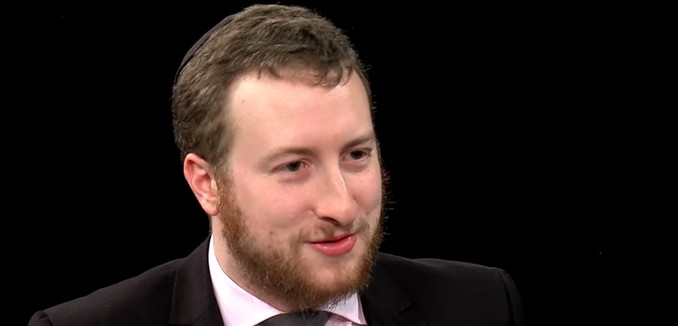The fight against campus anti-Semitism is “primarily one of education,” Dovid Efune, editor-in-chief of The Algemeiner said in a conference call hosted by The Israel Project on Tuesday, discussing his publication’s role in helping Jewish students grapple with anti-Israel and anti-Jewish hatred.
Efune explained that the education he referred to means “helping not just students but college administrators, and even fair-minded professors” what “they are facing on campuses, and realize the bigoted nature of many of these groups that are leading the charge.” He added that Students for Justice in Palestine (SJP), which is in the “forefront” of efforts to demonize Israel on campus, is an “overtly anti-Semitic group,” according to the definitions of the United States State Department and International Holocaust Remembrance Alliance.
Efune began the call by a discussion of the massacre of eleven Jews at a Pittsburgh synagogue on Saturday morning.
“I think it categorized for us or reaffirmed for us that hate, and certainly hatred of Jews, anti-Semitism, literally sits in a category of its own, and needs to be fought, and combatted in every which place it is found,” he said.
The editor also said that he found “the extent of how the wider American community, not just the Jewish community, was so repulsed by this hatred” to be “encouraging.”
A few years ago, The Algemeiner, Efune said, began compiling a list of the best and worst colleges for Jewish students to highlight “the challenges that these young students face.” Though The Algemeiner has been criticized for the rankings, “the most reinforcing feedback was when we heard from some of the students from some of the more troubling schools that finally they felt that their challenges and their plight had been recognized.” Efune observed.
Despite the challenges presented by anti-Semitism on campus — Efune cited a recent study that showed that the main predictor of anti-Semitic activity on a campus is the presence of an SJP chapter there — we are seeing a more “orchestrated and focused pushback.”
“The goal is to help people understand that despite the fact that they are framing themselves as social justice groups, as warriors for the rights of others, these groups are using such language as a veneer to hide their own inherent bigotry and hatred of all things Israel and Israeli,” Efune said, explaining the importance of education in fighting on-campus anti-Semitism. He observed further that often, now, SJP and similar groups are more overt, and “don’t even do a good job of hiding it.”
While Efune acknowledged that many Jewish students face challenges on campus, not everyone is so affected. He also pointed to some positive developments.
For example, in 2017 Fordham University in New York banned SJP from campus. The university is currently defending its action court against a challenge from a group, Palestine Legal. Efune said, when reviewing documents regarding the case — many of which, he observed, were based on The Algemeiner’s reporting — a pattern emerges that SJP scheduled many votes and other efforts for the Sabbath and Jewish holidays, when fewer Jewish students would be available to challenge them, showing a pattern of bigotry.
He also praised the administration of the University of Michigan for taking “concrete punitive measures” against a professor who refused to write a recommendation for a student who planned to spend a year studying in Israel. Efune said, while they couldn’t stop the professor from saying what he believed, they could respond to actions he took. He said that this was a “good model” for how other campuses could respond.
Efune also acknowledged “the power that media has to call people’s attention to things that prompt action on the ground.” In one case, the SJP chapter at Kent State University was pressuring the administration to remove a poster of the late Israeli Prime Minister Golda Meir. The quote from Meir was apolitical, but SJP objected nonetheless, and the administration considered giving in when The Algemeiner reported it.
The dean’s office contacted The Algemeiner and said that the administration had decided to leave the poster up. But the dean’s office asked The Algemeiner to promise to report on its decision because the phone calls protesting the decision to take down the post had become too much.
Efune concluded the call with a resume of the current political climate and how it affects Jewish students on campus, highlighting both the importance of separating the Trump administration’s policy on Israel from views of the president itself, as well as nurturing the bipartisan U.S.-Israel relationship.
The complete call is embedded below.
[Photo: JBS / YouTube ]




